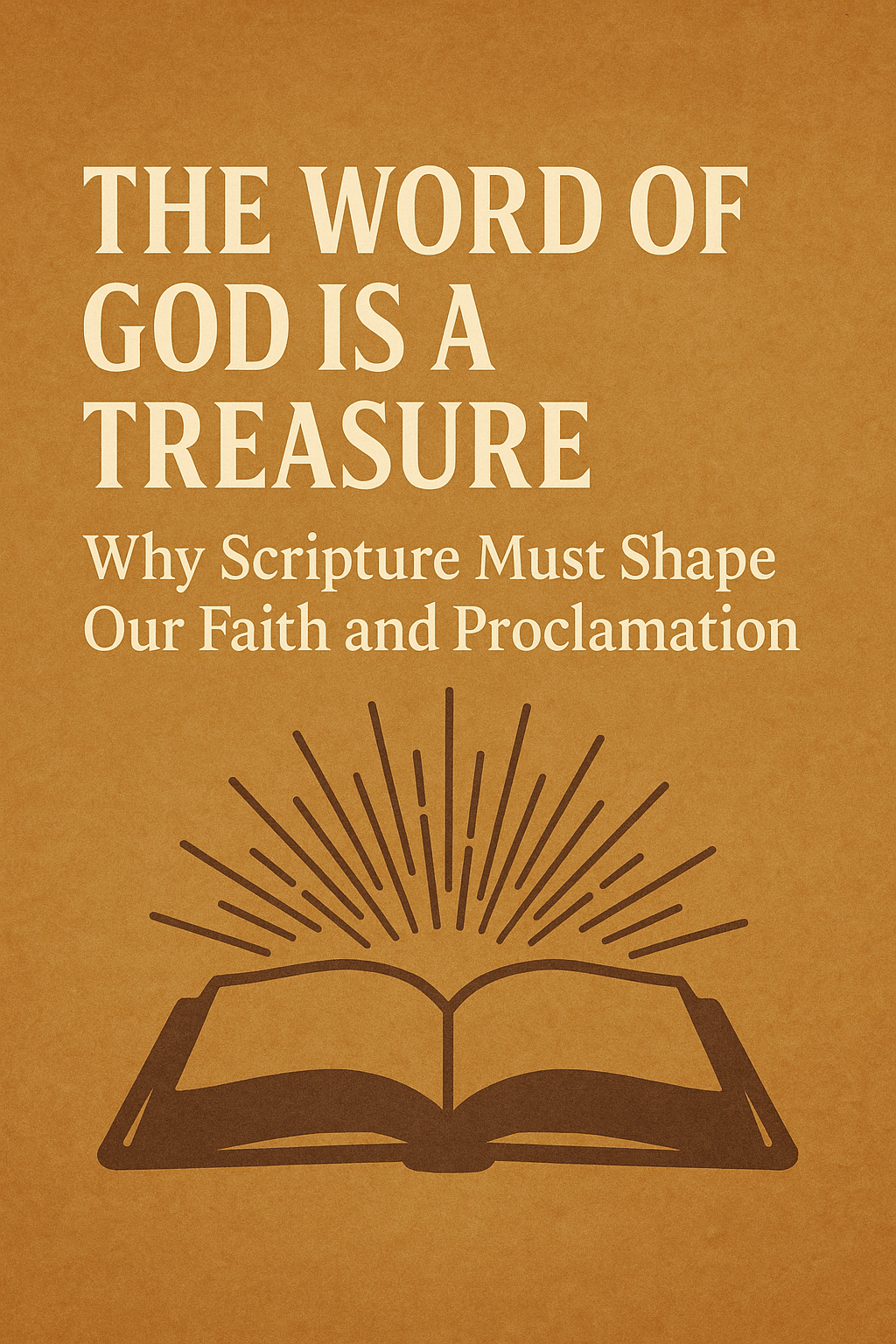⏱️ Estimated Reading Time: 7 min read
The Word of God Is a Treasure: Why Scripture Must Shape Our Faith and Proclamation
By Dave Jenkins
We live in a time of increasing confusion—not only in the world but within the Church itself. Cultural chaos, moral relativism, and theological drift have left many untethered from the truth. In such a moment, Christians must return—again and again—to the one foundation that never changes: the Word of God.
As the psalmist declares, “The sum of your word is truth, and every one of your righteous rules endures forever” (Psalm 119:160). Scripture is not merely a helpful resource; it is the treasure of the Church, the voice of our Shepherd, and the lamp to our feet and light to our path (Psalm 119:105). It is not only our standard for faith and practice—it is the very means by which we know God, treasure His promises, behold His beauty, grow in His grace, discern His ways, and proclaim Christ to the nations.
Scripture Is the Only Way to Truly Know the Living God
Many in our day speak about “God” in vague or mystical terms, as if He were a divine energy or undefined spiritual force. But the true and living God—the Triune God who created heaven and earth—has not left us to speculation. He has spoken.
Hebrews 1:1–2 reminds us: “Long ago, at many times and in many ways, God spoke to our fathers by the prophets, but in these last days he has spoken to us by his Son.” And how do we know the Son? Jesus Himself said, “You search the Scriptures… and it is they that bear witness about me” (John 5:39).
Apart from Scripture, we are left with man’s imagination. But in Scripture, we encounter God’s revelation. The Bible reveals His holiness, justice, mercy, love, and sovereignty. Most gloriously, it unveils Jesus Christ—God in the flesh, the supreme self-disclosure of the Father.
Scripture Helps Us Treasure the Promises of God
The promises of God are not feel-good slogans or sentimental sayings. They are blood-bought realities, unshakable and sure. The apostle Peter tells us that through God’s “precious and very great promises,” we “become partakers of the divine nature” and escape worldly corruption (2 Peter 1:4).
But how can we treasure what we do not know?
God’s promises are found and preserved in His Word. From Genesis 3:15’s promise of a coming Redeemer, to the covenants with Abraham and David, to their fulfillment in Christ—all of redemptive history reveals a faithful God who keeps His Word.
When suffering comes, it is Scripture that steadies the soul. When doubt arises, it is Scripture that reminds us of God’s faithfulness. As Paul proclaims, “All the promises of God find their Yes in [Christ]” (2 Corinthians 1:20).
Beholding God’s Beauty through His Word
The Bible is not a dry textbook of doctrine—it is a living window into the beauty and majesty of God. It stirs our affections even as it informs our minds.
David expresses the longing of every believer in Psalm 27:4: “One thing have I asked of the Lord… that I may dwell in the house of the Lord all the days of my life, to gaze upon the beauty of the Lord and to inquire in his temple.”
Where do we gaze upon that beauty today? In the pages of Scripture. From Genesis to Revelation, we behold the character of God, the wonder of His plan, and the glory of the gospel. As we behold Him, we are transformed (2 Corinthians 3:18).
Growing in Grace through God’s Word
Spiritual maturity does not happen by accident. It comes through abiding in Christ—and that means abiding in His Word.
Peter exhorts us: “Like newborn infants, long for the pure spiritual milk, that by it you may grow up into salvation” (1 Peter 2:2). Jesus prayed, “Sanctify them in the truth; your word is truth” (John 17:17). Paul reminds us that the Word trains us in righteousness and equips us for every good work (2 Timothy 3:16–17).
God’s Word is not a side tool for the Christian life—it is the instrument of transformation. It renews our minds, convicts our hearts, strengthens our faith, and shapes our obedience. Every true revival—personal or corporate—has always been rooted in a recovery of God’s Word.
Understanding What God Loves—and Hates—Through Scripture
In a time when morality is constantly redefined by culture, Scripture remains our compass.
God has not left us guessing about what is right and wrong. He has revealed His will. Proverbs 6:16–19 lists what the Lord hates. Psalm 119:128 proclaims, “I consider all your precepts to be right; I hate every false way.”
The Word of God teaches us to love what He loves and to hate what He hates—not based on emotions or popular opinion, but based on truth. Biblical discernment comes from a mind renewed by the Word (Hebrews 5:14), not from feelings or trends. If we want to walk in step with the Spirit, we must walk according to the Word He inspired.
The Word of God Fuels Gospel Proclamation
The Great Commission is not a call to vague spirituality—it’s a call to make disciples by teaching everything Christ has commanded (Matthew 28:18–20). Gospel proclamation must be rooted in biblical truth.
Paul urged Timothy to “preach the Word… in season and out of season” (2 Timothy 4:2), because it is the Word that brings the dead to life and the sinner to repentance. Whether we’re preaching from a pulpit, discipling our children, or speaking truth to our neighbors, the message is the same: the Word of God.
We are not inventors of truth—we are stewards of revelation. And our mission is to declare the whole counsel of God for the glory of Christ.
Anchored by God’s Word in a Confused World
The world offers many voices—but only one Word is eternal. “The grass withers, the flower fades, but the word of our God will stand forever” (Isaiah 40:8).
Jesus illustrated the contrast between wisdom and folly with a single image: one who builds on the rock versus one who builds on sand (Matthew 7:24–27). The one who hears and obeys His Word stands firm. The one who builds on opinions or emotions collapses under pressure.
In an age of shifting values and shallow slogans, we must stand where God has spoken. If we neglect His Word, we drift. If we build upon it, we endure.
Let Us Be People of the Word
The Church does not need new revelations, clever strategies, or cultural compromise. What we need—what we have always needed—is to return to the God-breathed, Christ-exalting, all-sufficient Word.
Let us not treat Scripture as a side dish but as the feast. Let us not rely on our own wisdom but walk in reverent submission to God’s truth. Let us not remain silent where God has spoken.
The Word of God is a treasure. If we want to know God, cherish His promises, grow in grace, and proclaim Christ to a world in desperate need—we must start and stay with Scripture.
And may we do so not for our own recognition, but for the glory of God among the nations.
Check out our Scripture for Life series.
Dave Jenkins is happily married to his wife, Sarah. He is a writer, editor, and speaker living in beautiful Southern Oregon. Dave is a lover of Christ, His people, the Church, and sound theology. He serves as the Executive Director of Servants of Grace Ministries, the Executive Editor of Theology for Life Magazine, the Host and Producer of Equipping You in Grace Podcast, and is a contributor to and producer of Contending for the Word. He is the author of The Word Explored: The Problem of Biblical Illiteracy and What To Do About It (House to House, 2021), The Word Matters: Defending Biblical Authority Against the Spirit of the Age (G3 Press, 2022), and Contentment: The Journey of a Lifetime (Theology for Life, 2024). You can find him on Facebook, Twitter, Instagram, Youtube, or read his newsletter. Dave loves to spend time with his wife, going to movies, eating at a nice restaurant, or going out for a round of golf with a good friend. He is also a voracious reader, in particular of Reformed theology, and the Puritans. You will often find him when he’s not busy with ministry reading a pile of the latest books from a wide variety of Christian publishers. Dave received his M.A.R. and M.Div through Liberty Baptist Theological Seminary.




